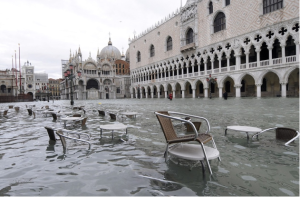Sepanjang sejarah, peradaban telah bangkit dan jatuh, tapi beberapa, seperti Cina, telah bertahan selama ribuan tahun. Salah satu rahasia umur panjang Tiongkok adalah penerapan prinsip feng shui, khususnya dalam perencanaan kota. Beijing, Misalnya, was designed following these ancient rules, allowing it to stand strong for over three thousand years. Feng shui, which translates to “wind (風) and water (水),” places immense importance on the flow and presence of water as a determining factor in the prosperity of a city.
In feng shui, water is one of the most powerful elements, symbolizing wealth, abundance, and the movement of energy (qi-氣). The flow, positioning, and direction of water in a city can significantly influence its economic success, harmony, and overall vitality. Cities blessed with rivers, lakes, or coastal areas are often seen as auspicious in feng shui because flowing water allows wealth to circulate freely. When water flows towards a city, it brings prosperity; when it flows away, it can signify the draining of wealth. Stagnant water, on the other hand, can represent blocked energy, leading to stagnation in the city’s growth.
The Balance of Water in City Feng Shui
In feng shui, it’s not just about having water but ensuring that it’s balanced with other elements, particularly earth. Too much water can create chaos and imbalance, while too little can limit financial opportunities. The relationship between water features and the surrounding landscape must harmonize to promote a balanced flow of energy. In fact, research conducted by Mak (1998) identified five key geographical features that contribute to a city’s feng shui: dragon veins, tortoise hill, white tiger, cave, and water. Across various cities studied, water consistently played a crucial role in promoting prosperity, with cities like Beijing, Hong Kong, Tokyo, and London benefiting from natural water flows such as rivers and coastlines.


Las Vegas: Prosperity in the Desert
Las Vegas presents a fascinating example of adapting feng shui principles in an unconventional environment. Despite being located in a desert with scarce natural water sources, the city thrives. From a feng shui perspective, water still plays a vital role in Las Vegas’ success—albeit through artificial means. The nearby Hoover Dam and Lake Mead are significant contributors to the city’s growth, symbolizing control over wealth and resources. In feng shui, dams represent the ability to regulate and store wealth, much like the Hoover Dam manages the flow of the Colorado River and generates hydroelectric power for the region. This controlled harnessing of water has fueled Las Vegas’ economy.
However, the city’s prosperity also comes with risks. Las Vegas faces water scarcity due to drought and overuse of Lake Mead, which has been shrinking over the years. From a feng shui perspective, the diminishing water supply could foreshadow potential instability in the city’s wealth and resources in the future. Water is essential for sustaining energy, and its depletion may lead to challenges in maintaining Las Vegas’ current level of prosperity.

Venice: The Consequences of Excess Water
Venice offers a contrasting example, highlighting the dangers of excess water. Built directly on a lagoon, Venice once thrived as a major trade hub due to its waterborne position. In feng shui, the city’s canals symbolized the flow of wealth and prosperity, contributing to its historical prominence. However, Venice’s current struggles with sinking and frequent flooding demonstrate the risks associated with an overabundance of water.
The phenomenon of “acqua alta” (high water), where rising tides flood Venice’s streets and squares, represents chaotic and uncontrolled water energy in feng shui. Persistent flooding disrupts the city’s balance, leading to economic strain and damage to infrastructure. Excess water has become a liability, destabilizing the city and hindering its long-term sustainability. The construction of MOSE, a system of flood barriers designed to protect Venice, is an attempt to regain control over the water element. However, its long-term effectiveness is uncertain, and the city continues to face challenges from its precarious relationship with water.

Lessons from Feng Shui: Water’s Dual Role
Water’s role in feng shui is twofold: it can bring wealth and vitality but also poses risks if not managed properly. Venice’s flooding and sinking illustrate the dangers of too much water, while Las Vegas’ reliance on artificial water sources highlights the challenges of maintaining prosperity in arid conditions. The key lies in balance—ensuring that water is present in a way that harmonizes with the landscape and other elements to promote steady growth and stability. As cities continue to evolve, understanding and applying feng shui principles to water management can offer valuable insights into fostering prosperity while safeguarding against potential imbalances. From the flowing rivers of ancient Beijing to the artificial lakes of Las Vegas and the sinking canals of Venice, water remains a crucial factor in shaping the fortunes of cities around the world.
Reference:
Mak, M. Y. “Application of Feng Shui principles to major cities in the world.” Science and design (1998): 83-89
